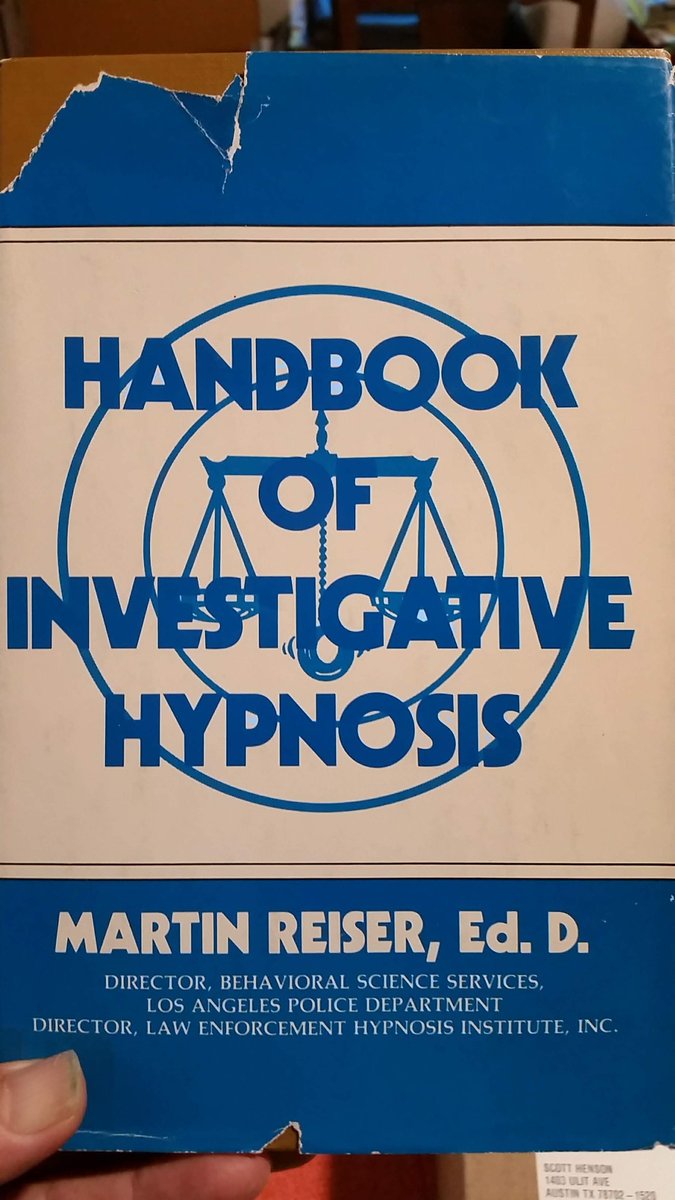 |
| Required textbook for Texas forensic hypnosis certification class |
Another Tweet in that string cited to the TCOLE curriculum for forensic hypnosis wondering aloud why the state would require detectives being trained in forensic hypnosis to demonstrate proficiency in post-hypnotic suggestions? (Item 14) Should detectives really be taught to implant memories in hypnotized witnesses? That seems dubious, at best.
There was a time when more than 800 Texas peace officers boasted forensic hypnosis certifications. Today, just two agencies - Texas DPS and the Harris County Sheriff's Office - employ nearly all of the fewer than two dozen forensic hypnotists in the state.
Indeed, forensic hypnosis appears to be a dying profession in Texas. There aren't many trainings conducted anymore. Pam Colloff, Mandy Marzullo and I wanted to take a forensic-hypnosis-certification course this year, but could not find one given in the state of Texas throughout all of 2018.
Most practitioners boast gray hair and decades-long resumes, and there doesn't appear to be an eager new guard anxious to stake their careers on a practice that's perhaps a half step above a tarot-card reading in terms of investigative utility.
The Texas Legislature should absolutely pass Sen. Hinojosa's SB 130, and while they're at it, they should get rid of this ridiculous certification at TCOLE. It can't be fixed. There's no scientific version of hypnosis-based memory enhancement to fall back on, even if the agency wanted to revise its trainings, which mostly don't occur anymore.
Anyway, TCOLE doesn't have sufficient curriculum staff to revise outdated police trainings, which is a budget question this blog will be revisiting later. They could use three additional FTEs for that purpose, according to the "exceptional items" request in their LAR. (And that's a no-BS request; their backlog is worrying.)
Neither can the Legislature count on the Forensic Science Commission to address the question, although they have received multiple complaints on the topic. That's because, by statute, they are only allowed to consider forensics related to "physical evidence." So hypnosis has somehow slithered through unintended gaps in the government's forensic-vetting apparatus.
That leaves the issue on the Legislature's doorstep. The case seems easy to make: In 2018, a curriculum suggesting police try to get witnesses to engage in "automatic writing," or teaching cops to implant post-hypnotic suggestions, doesn't even pass the laugh test. And yet that's the state of evidence Texas courts have allowed, with the Court of Criminal Appeals reaffirming the admissibility of hypnotically induced testimony as recently as 2004.
Courts in Texas have until now abdicated their duty to protect the public from junk science when it comes to admissibility of forensic hypnosis. In such instances, it's necessary and proper for the Legislature to step in. Bully for Chuy Hinojosa for doing so.
For more background on the topic, see:
- A brief primer on forensic hypnosis
- You're getting sleepy, so you won't notice Texas is still using junk science like 'forensic hypnosis' in death penalty cases
- Reasonably Suspicious podcast, Nov. 2017 (beginning at 28:10 mark)
- Reasonably Suspicious podcast, May 2018 (beginning at 21:19 mark)
- The Dallas News' Lauren McGaughy authored the best MSM deep dive on the topic.


.jpg)